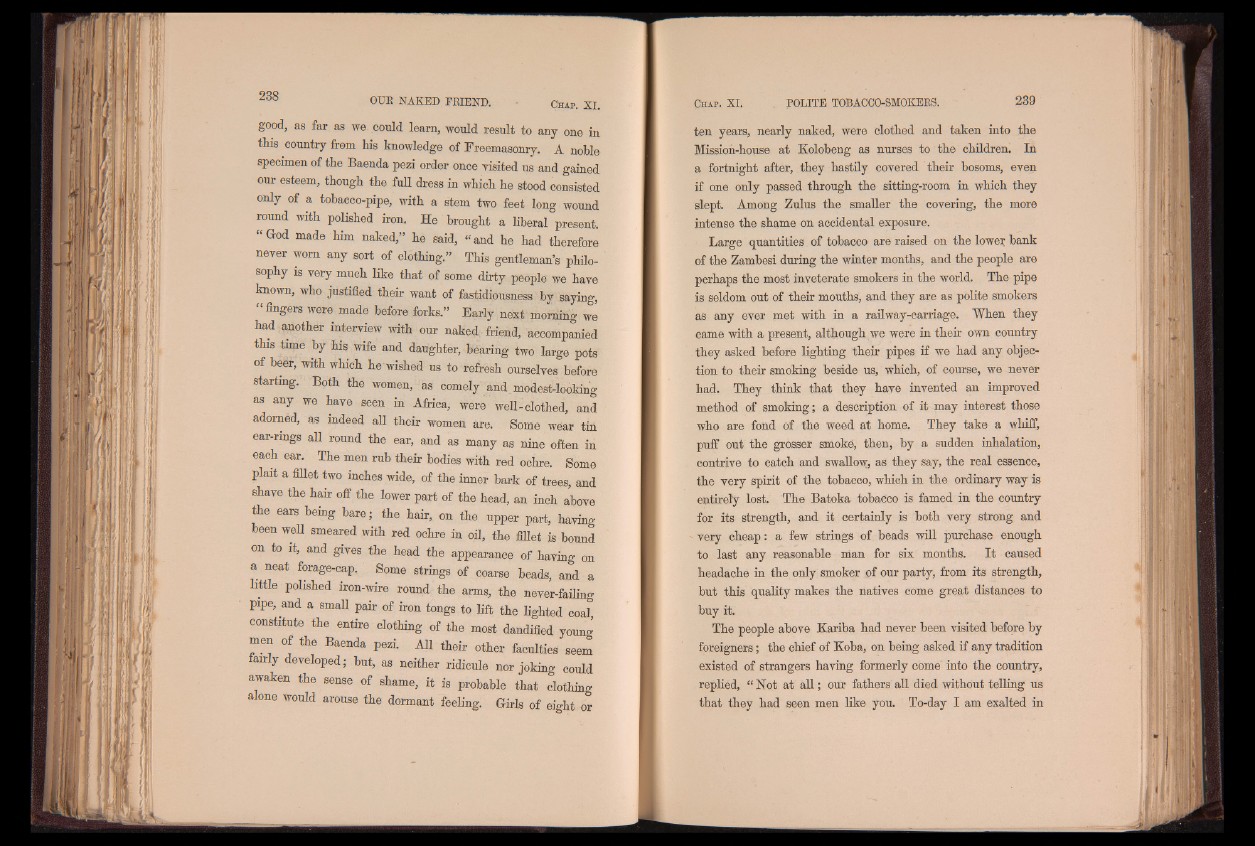
good, as far as we. could learn, would result to any one in
this country from his knowledge of Freemasonry. A noble
specimen of the Baenda pezi order once -visited us and gained
our esteem, though the full dress in which he stood consisted
only of a tobacco-pipe, with a stem two feet long wound
round with polished iron. He brought a liberal present.
“ God made him naked,” he said, “ and he had therefore
never worn any sort of clothing.” This gentleman’s philosophy
is very much like that of some dirty people we have
known, who justified their want of fastidiousness by saying,
“ fingers were made before forks.” Early next morning we
had another interview with our naked friend, accompanied
this time by his wife and daughter, bearing two large pots
of beef, with which he wished us to refresh ourselves before
starting. Bpth the women, as comely and modest-looMng
as any we have seen in Africa, were well-clothed, and
adorned, as indeed all their women are. Some wear tin
ear-rings all round the ear, and as many as nine often in
each ear. The men rub their bodies with red ochre. Some
plait a fillet two inches wide, of the inner bark of trees, and
shave the hair off the lower part of the head, an inch above
the ears being bare; the hair, on the upper part, having
been well smeared with red ochre in oil, the fillet is bound
on to it, and gives the head the appearance of having on
a neat forage-cap. Some strings of coarse beads, and a
little polished iron-wire round the arms, the never-failing
pipe, and a small pair of iron tongs to lift the lighted coal,
constitute the entire clothing of the most dandified young
men of the Baenda pezi. All their other faculties seem
fairly developed; but, as neither ridicule nor joking could
awaken the sense of shame, it is probable that clothing
alone would arouse the dormant feeling. Girls of eight or
ten years, nearly naked, were clothed and taken into the
Mission-house at Kolobeng as nurses to the children. In
a fortnight after, they hastily covered their bosoms, even
if one only passed through the sitting-room in which they
slept. Among Zulus the smaller the covering, the more
intense the shame on accidental exposure.
Large quantities of tobacco are raised on the lower bank
of the Zambesi during the winter months, and the people are
perhaps the most inveterate smokers in the world. The pipe
is seldom out of their mouths, and they are as polite smokers
as any ever met with in a railway-carriage. When they
came with a present, although we were in their own country
they asked before lighting their pipes if we had any objection
to their smoking beside us, which, of course, we never
had. They think that they have invented an improved
method of smoking; a description of it may interest those
who are fond of the weed at home. They take a whiff,
puff out the grosser smoke, then, by a sudden inhalation,
contrive to catch and swallow, as they say, the real essence,
the very spirit of the tobacco, which in the ordinary way is
entirely lost. The Batoka tobacco is famed in the country
for its strength, and it certainly is both very strong and
very cheap: a few strings of beads will purchase enough
to last any reasonable man for six months. I t caused
headache in the only smoker of our party, from its strength,
but this quality makes the natives come great distances to
buy it.
The people above Kariba had never been visited before by
foreigners; the chief of Ebba, on being asked if any tradition
existed of strangers having formerly come into the country,
replied, “ Not at a ll; our fathers all died without telling us
that they had seen men like you. To-day I am exalted in